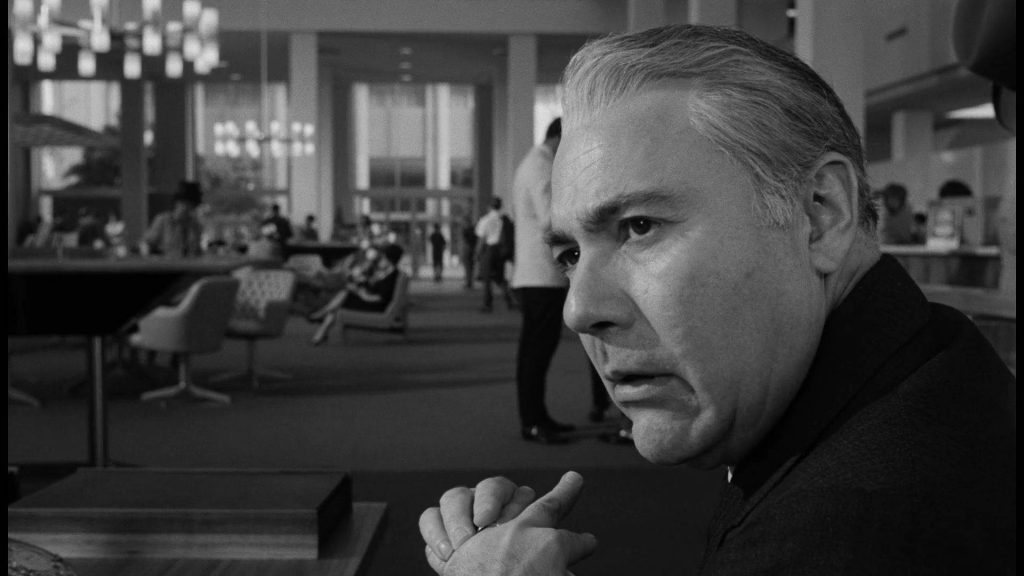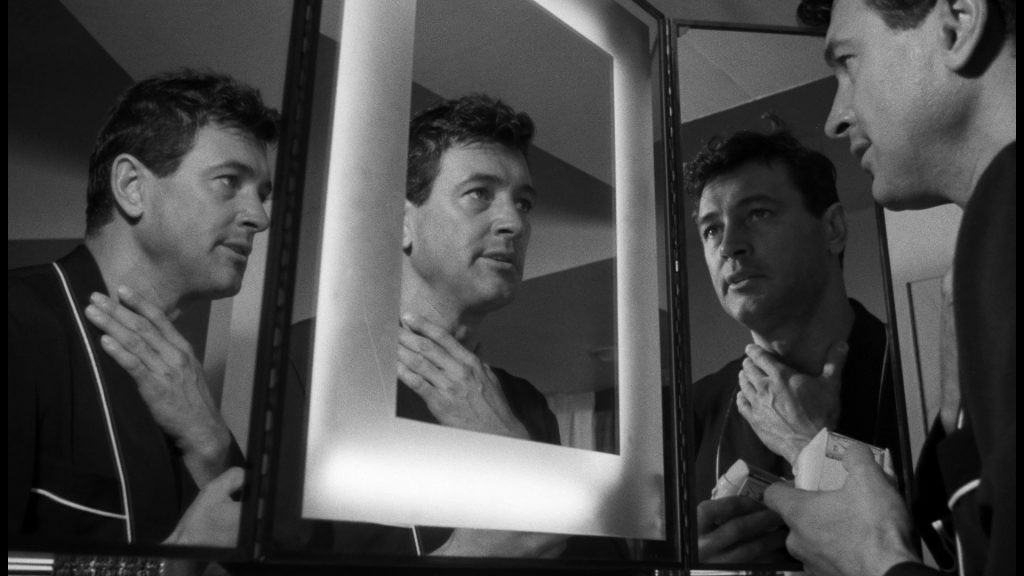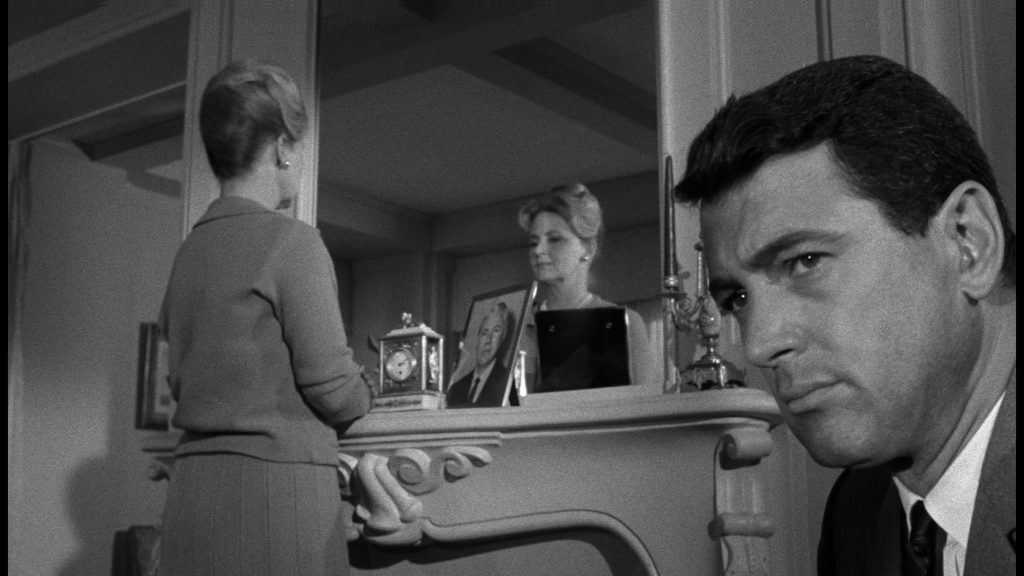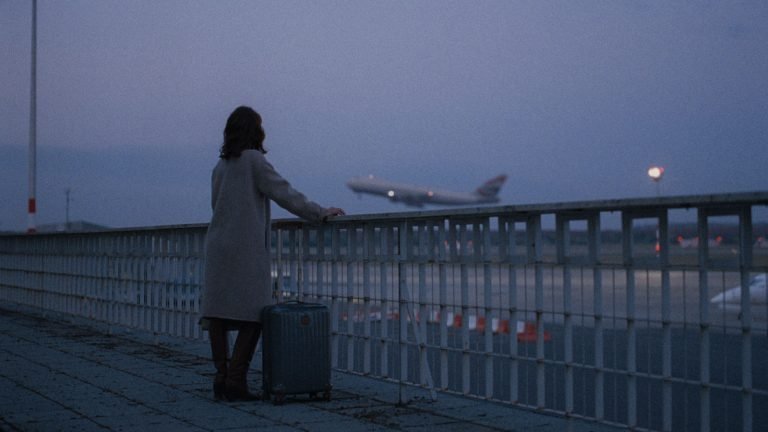
Seconds
(dir. John Frankenheimer, 1966)
- Published on January 26, 2019
- by Igor Fishman
A stranger approaches you at the train station and hands you a note. You speak with a man who claims to be your dead friend. Reality as you know it begins to unravel. This is the nightmare world that envelops you in within the opening moments of this thriller masterpiece.
In many ways, Seconds feels like a Twilight Zone episode shelved for being too disturbing for a mainstream audience. The film opens with a single question: Would you trade your life away to start fresh as someone else? But there is much more going on than a simple idea of second chances. Seconds interrogates not only the wish fulfillment of a second life, but the very ideas of identity and the fabric of the American Dream.
Who better to helm this type of project than John Frankenheimer the director of The Manchurian Candidate? His famous paranoid thriller was stuffed with shifting identities and ideologies in cold-war. But while Seconds shares a number of features with The Manchurian Candidate, it is a far departure from the confines of a traditional thriller.
It’s a film that oozes strangeness from every pore, all of it accentuated by the camerawork of legendary cinematographer James Wong Howe. In the audio commentary of the Criterion release, Frankenheimer talks at length at Wong Howe’s unique methods of capturing intensity with canted camera angles, wide angle lenses, and low lighting. Each moment feels anxious and uncomfortable mirroring the brooding dread of our protagonist.

The basics are as follows, a man is approached by a mysterious corporation that coerces him into signing up for their service. At the heart of it, the promise of a new life. While all of these elements set the tone for what’s to come, and a wonderfully angst ridden performance from John Randolph leads us into the story, things really kick into high gear once Rock Hudson shows up.
Hudson’s role here is uncharacteristically serious for an actor known for playing the charming lead in romantic films, and even though audiences at the time refused to take him seriously, looking back now, its clear he rose to this task. Hudson would later tell Frankenheimmer that this was the film he was most proud of, and seeing the layered performance here, it’s easy to see why.
In many ways the film builds to Hudson’s entrance as the man in his new body, set to live a new life. His performance is so heartrendingly genuine it is hard to not feel it infused with all of Hudson’s personal anguish and frustrations with Hollywood. As an actor Hudson was hounded by reporters and blackmailers threatening to reveal his sexuality, which at the time could unravel his career.

You see, you don’t have to prove anything anymore, you are accepted, you will be in your own new dimension.
This is the promise of the company pitch, and the real brilliance of the ideas at hand. In Seconds, the rebirth isn’t really about the fresh start, but rather the dream of being replanted into a world where you are liberated from your day to day alienation. A place where no one questions your worth, or your integrity, and the veneer of your existence, the facsimile of yourself is enough.
Once our protagonist transitions, what we are watching less so resembles the, at times, cheeky tropes of the Twilight Zone and instead feels more and more like the beach house of Ingmar Bergman‘s masterpiece Persona. Interesting to note that Persona incidentally came out the same year in 1966. Meanwhile the breakdown at the Santa Barbara vineyard brings to mind the pessimism and questioning of the American Dream that Easy Rider will absolutely nail three years later.

These ideas burble and burst up to the surface until we reach the very limits of what the promise of the dream itself represents. As we move towards the ending, Seconds is uncompromising, and boldly closes with a vicious final salvo. At the end of Seconds we are left with several bigger existential questions than when we began.
Much like Soylent Green, They Live, or last year’s Sorry To Bother You, we are presented with a view of a world that is meant to jar us awake. As the film concludes, it’s hard not to think about how easily we slip into roles and identities, that were seemingly thrust at us, and how profoundly unsatisfying and shallow those roles can often feel.
In 2013, Criterion Collection released a remastered version making this amazing film widely available again, and now it is easily accessible for rent on all the streaming platforms. Don’t miss your chance to catch it, it’s a thrilling cult classic that feels more vital and relevant than ever.
Where to stream Seconds: Kanopy
Rent Seconds: iTunes, Google Play, Amazon


‘Lapsis’ Review: Skewering the Gig Economy
Noah Hutton’s sci-fi satire Lapsis may stumble at times, but its punchy riffs on the gig economy make it worth a look.

‘Just Don’t Think I’ll Scream’ Review
(link to theQuietus.com)
A staggering work that uses clips from over 400 films to tell a personal story about cinephilia, alienation, and loss, while speaking directly to our anxious moment. Read my review in The Quietus.

‘Preparations to be Together for an Unknown Period of Time’ Review
(link to UltraDogme.com)
A Sylvia Plath poem comes to life in this meditation on loneliness, infatuation, and love as it exists in our inner worlds. Read my review at Ultra Dogme.

‘Some Kind of Heaven’ Review
(link to InReviewOnline.com)
Equal parts Errol Morris and David Lynch, this oddball journey through the world’s largest retirement community reveals a startling portrait of American alienation. Read my review at In Review Online.

The Ten Best Films of 2020
With 2020 finally drawing to a close, lets take one last look at the wonderful films that came out in this otherwise devastating year.

‘Black Bear’ Review: Aubrey Plaza’s Time to Shine
Aubrey Plaza shows off her considerable talents and range, overcoming a messy script to once again prove her mettle as a formidable dramatic lead.
